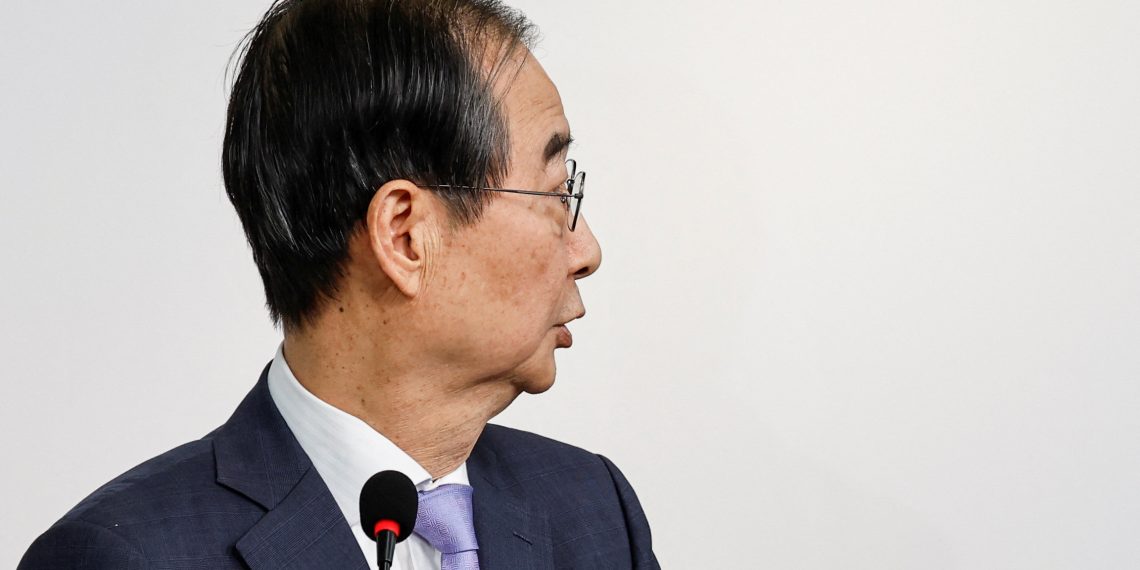In a dramatic turn of events, South Korea’s National Assembly voted on Friday to impeach Acting President Han Duck-soo, intensifying the nation’s already volatile political landscape. The impeachment comes just two weeks after the ousting of President Yoon Suk Yeol, marking an unprecedented political crisis in the country’s democratic history.
Impeachment Breakdown
A total of 192 lawmakers backed the motion against Han, exceeding the 151-vote threshold required for passage. The vote was triggered by allegations that Han obstructed the appointment of three judges critical to the impeachment process of his predecessor, President Yoon, further complicating an already fraught situation.
Han, who assumed presidential duties after Yoon’s December 3 impeachment, faced accusations from opposition lawmakers of stonewalling efforts to ensure a fair and impartial judiciary. His impeachment now places Finance Minister Choi Sang-mok as the interim acting president while the Constitutional Court deliberates on the matter—a process that could take up to 180 days.
Dramatic Scenes in Parliament
The parliamentary vote was far from orderly. Lawmakers from the ruling People Power Party (PPP) erupted in protest as National Assembly Speaker Woo Won-shik announced that only 151 votes were necessary for Han’s impeachment, unlike the 200-vote supermajority required to impeach Yoon earlier this month.
Chanting “Invalid!” and accusing Woo of abusing his power, ruling party MPs boycotted the vote en masse, leaving opposition lawmakers to proceed unopposed. The chaotic scenes underscored the deep divisions in South Korean politics, which have reached boiling point since Yoon’s controversial declaration of martial law earlier this month.
Political Fallout
The impeachment of both Yoon and Han has plunged South Korea into uncharted territory. This is the first time an acting president has been impeached since the country transitioned to democracy. The implications are profound, as the Constitutional Court now holds the fate of both impeachments, requiring six of its nine judges to uphold the motions.
However, with only six judges currently seated—a result of Han’s refusal to confirm parliamentary nominees—the chances of Yoon’s impeachment being overturned remain precariously high. Critics argue that this political deadlock could erode public trust in the nation’s democratic institutions.
Economic Turmoil
As political chaos deepens, South Korea’s economy is showing signs of strain. The Korean won plummeted to its lowest value against the dollar since the 2008 financial crisis. Both ruling and opposition parties are blaming each other for the instability, leaving businesses and citizens grappling with uncertainty.
Yoon’s Martial Law Fallout
The roots of this crisis trace back to December 3, when President Yoon shocked the nation by declaring martial law, citing the threat of “anti-state forces.” His abrupt reversal of the order, after 190 MPs stormed parliament to vote it down, did little to quell the outrage. Yoon later apologized but maintained that his actions were aimed at protecting democracy.
Since then, Yoon and his allies have faced a torrent of legal challenges, with top officials arrested on insurrection charges. The suspended president has defied multiple summons from investigators, further aggravating tensions. Yoon’s impeachment trial, combined with the removal of Han, has left South Korea in a state of unprecedented political paralysis.
The Road Ahead
Han’s impeachment, while dramatic, is only the latest chapter in South Korea’s unfolding crisis. The opposition’s ability to push through major political moves without bipartisan support highlights the fragility of the nation’s political system. As South Korea awaits the Constitutional Court’s rulings, the focus shifts to whether new leadership can stabilize a country teetering on the edge of political and economic uncertainty.









